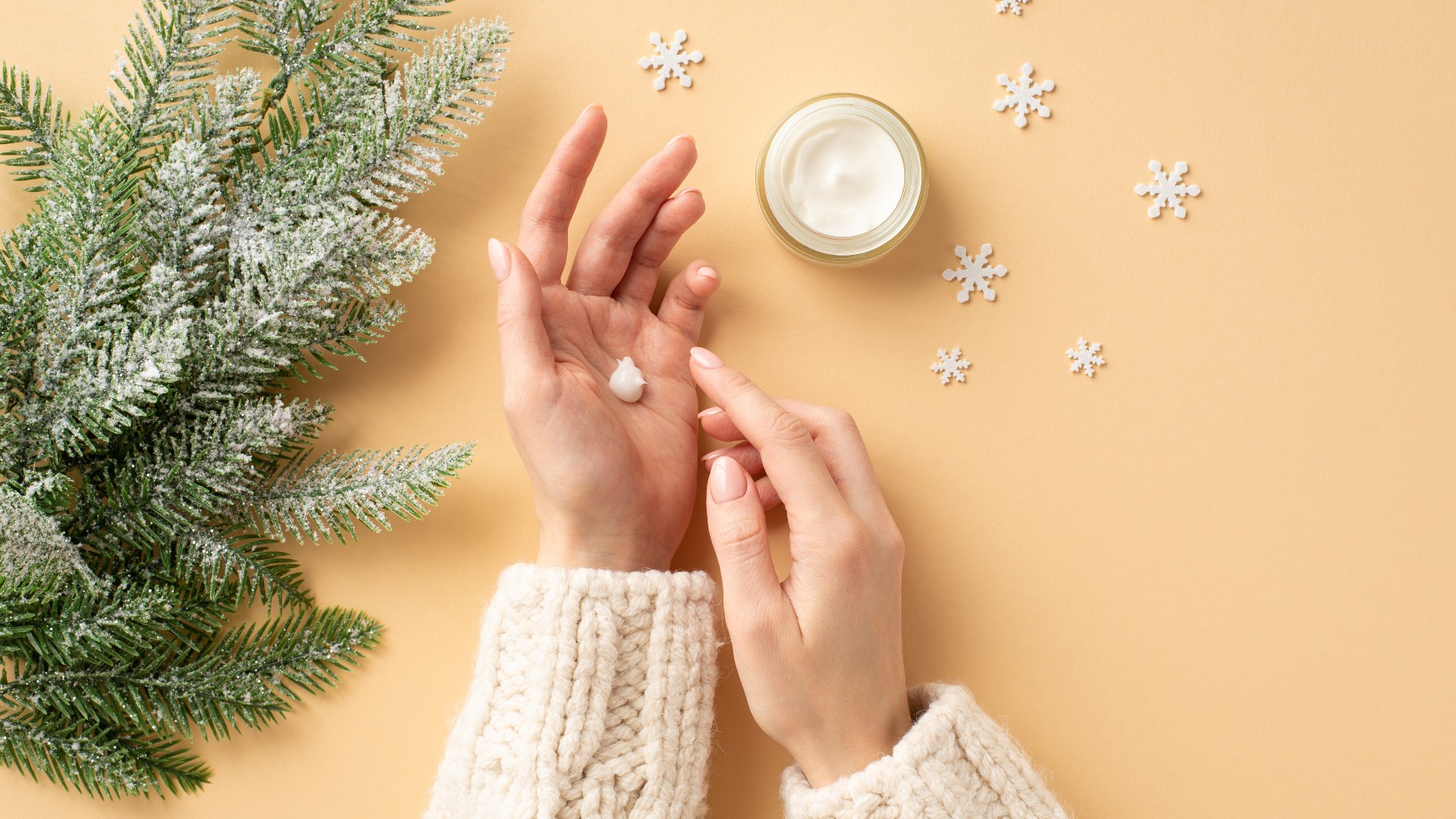4 tips for protecting your skin during winter
The temperature drop could make anyone susceptible to dryer skin. Time to switch up your skin care routine.


A free daily email with the biggest news stories of the day – and the best features from TheWeek.com
You are now subscribed
Your newsletter sign-up was successful
Between the temperature dropping outside and the heat being cranked up indoors, the seasonal battle against dry skin has begun. Keeping your skin moisturized is essential year-round, but the dry fall and winter air make doing so especially difficult this time of year.
Your skin's job is to "keep the inside world in and the outside world out," Dr. Brittany Craiglow, dermatologist and associate adjunct professor of dermatology at the Yale School of Medicine, told The New York Times. The lipid barrier, the outermost layer of skin composed of fatty compounds, helps keep hydration and germs and toxins out. When the air gets drier, moisture is pulled from that layer, impairing skin cell turnover and leading to dry and flaky skin, Dr. Craiglow noted.
While some people, like older adults and people with eczema, are prone to dryer skin, it can happen to anyone. But with these four expert tips on protecting your skin from the colder weather, you up your chances of keeping your skin moisturized and content.
The Week
Escape your echo chamber. Get the facts behind the news, plus analysis from multiple perspectives.

Sign up for The Week's Free Newsletters
From our morning news briefing to a weekly Good News Newsletter, get the best of The Week delivered directly to your inbox.
From our morning news briefing to a weekly Good News Newsletter, get the best of The Week delivered directly to your inbox.
Skip the long, hot shower
The winter is not the best time to take long hot showers, even though that might seem counterintuitive. Hot showers strip oil from your skin and so can some fragranced cleansers. Experts recommend switching to shorter, cooler showers with fragrance-free soap. Lukewarm showers might sound like the last thing you want on a cold night, "but it's something to keep in mind if you’re having an eczema flare or your skin is super dry," Dr. Craiglow noted. Your shower temperature "should be what you would imagine a heated pool to feel like in the summertime," Dr. Joshua Zeichner, an associate professor of dermatology and the director of Cosmetic and Clinical Research in Dermatology at Mount Sinai Hospital, told Health.
The thicker the moisturizer, the better
Once you get out of the shower, using a moisturizer on your face and skin while you are still damp is best. Boring is ideal when choosing a moisturizer. "The more bland, the better," Craiglow said. Again, avoiding fragrances and preservatives such as parabens or methylisothiazolinone is optimal since they can irritate already dry skin. Instead, she recommends brands such as Aquaphor, Cetaphil, CeraVe and Vanicream, per the Times. Thick, "occlusive" products like petroleum jelly help create a physical barrier that acts as a sealant and is the best bet for the season. If, however, you would rather use a cream or lotion in place of a heavier moisturizer, that's better than nothing, Dr. Jeffrey Weinberg, a clinical professor of dermatology at the Icahn School of Medicine at Mount Sinai, told the Times. "A cream you use is better than an ointment you don't use."
The American Academy of Dermatology recommends products with these ingredients for people with dry skin: jojoba or mineral oil, dimethicone, glycerin, hyaluronic or lactic acid, lanolin, petrolatum and shea butter.
Add a humidifier
Decreased air humidity contributes to dry skin, so now is a good time to swap out your dehumidifier for a humidifier in your home or workspace. Humidifiers can help recirculate moisture in indoor environments, such as buildings with dry heat. "Just make sure you clean it out and change the water every day — humidifiers can be a great place for bacteria to grow," Dr. Weinberg told the Times.
A free daily email with the biggest news stories of the day – and the best features from TheWeek.com
Be patient with your skin
If you're already struggling with really dry or cracked skin, you may have broken your skin barrier, which would take weeks or months to heal, Dr. Shasa Hu, associate professor in the department of dermatology and cutaneous surgery at the University of Miami Miller School of Medicine, told Today. "It takes at least three to four weeks for that skin barrier to fully repair, so start early," she said.
If you already have a skin condition like eczema, psoriasis or rosacea or you're just looking for guidance, don't hesitate to contact a dermatologist, Dr. Shari Lipner, associate professor of clinical dermatology at the Weill Cornell Medical Center, told TODAY. "If you have any of these conditions, it's a great time to check in to make sure the winter is not causing havoc on your skin," Lipner added, noting that telemedicine would work well for this.
Theara Coleman has worked as a staff writer at The Week since September 2022. She frequently writes about technology, education, literature and general news. She was previously a contributing writer and assistant editor at Honeysuckle Magazine, where she covered racial politics and cannabis industry news.
-
 The EU’s war on fast fashion
The EU’s war on fast fashionIn the Spotlight Bloc launches investigation into Shein over sale of weapons and ‘childlike’ sex dolls, alongside efforts to tax e-commerce giants and combat textile waste
-
 How to Get to Heaven from Belfast: a ‘highly entertaining ride’
How to Get to Heaven from Belfast: a ‘highly entertaining ride’The Week Recommends Mystery-comedy from the creator of Derry Girls should be ‘your new binge-watch’
-
 The 8 best TV shows of the 1960s
The 8 best TV shows of the 1960sThe standout shows of this decade take viewers from outer space to the Wild West
-
 ‘Zero trimester’ influencers believe a healthy pregnancy is a choice
‘Zero trimester’ influencers believe a healthy pregnancy is a choiceThe Explainer Is prepping during the preconception period the answer for hopeful couples?
-
 ‘Longevity fixation syndrome’: the allure of eternal youth
‘Longevity fixation syndrome’: the allure of eternal youthIn The Spotlight Obsession with beating biological clock identified as damaging new addiction
-
 Stopping GLP-1s raises complicated questions for pregnancy
Stopping GLP-1s raises complicated questions for pregnancyThe Explainer Stopping the medication could be risky during pregnancy, but there is more to the story to be uncovered
-
 RFK Jr. sets his sights on linking antidepressants to mass violence
RFK Jr. sets his sights on linking antidepressants to mass violenceThe Explainer The health secretary’s crusade to Make America Healthy Again has vital mental health medications on the agenda
-
 Nitazene is quietly increasing opioid deaths
Nitazene is quietly increasing opioid deathsThe explainer The drug is usually consumed accidentally
-
 The plant-based portfolio diet invests in your heart’s health
The plant-based portfolio diet invests in your heart’s healthThe Explainer Its guidelines are flexible and vegan-friendly
-
 Tips for surviving loneliness during the holiday season — with or without people
Tips for surviving loneliness during the holiday season — with or without peoplethe week recommends Solitude is different from loneliness
-
 More women are using more testosterone despite limited research
More women are using more testosterone despite limited researchThe explainer There is no FDA-approved testosterone product for women
